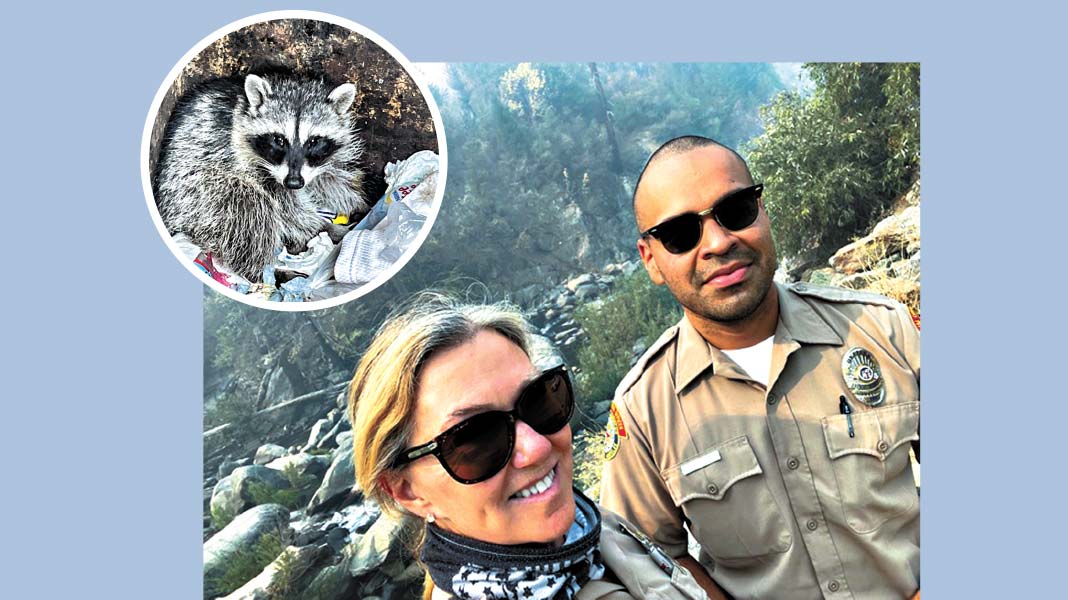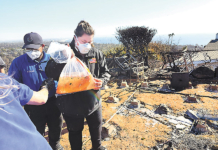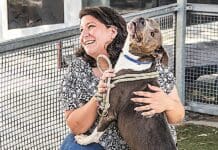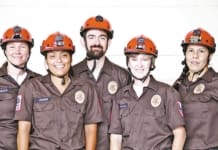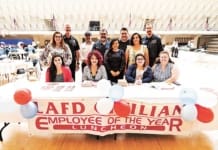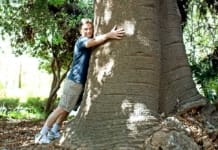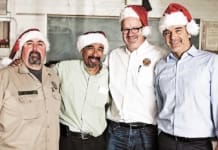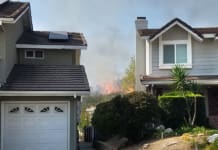A Hand for a Paw or Two
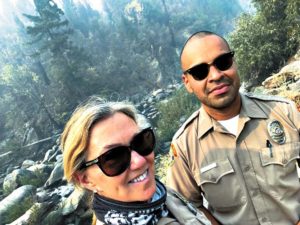
Animal Services: As the Caldor Fire devastated the South Lake Tahoe area last August, people and their homes weren’t the only victims. Animals needed to be rescued, too.
That’s when Officers Lois Westphal and Eddie Anaya answered the emergency call and headed north for 10 days plus two travel days. Below, Officer Westphal gives us a first-person account of what it was like.
The Club thanks Lois for her contribution, and Animal Services District Supervisor Danny Pantoja for suggesting the story.
At the Caldor Wildfire
By Animal Control Officer Lois Westphal
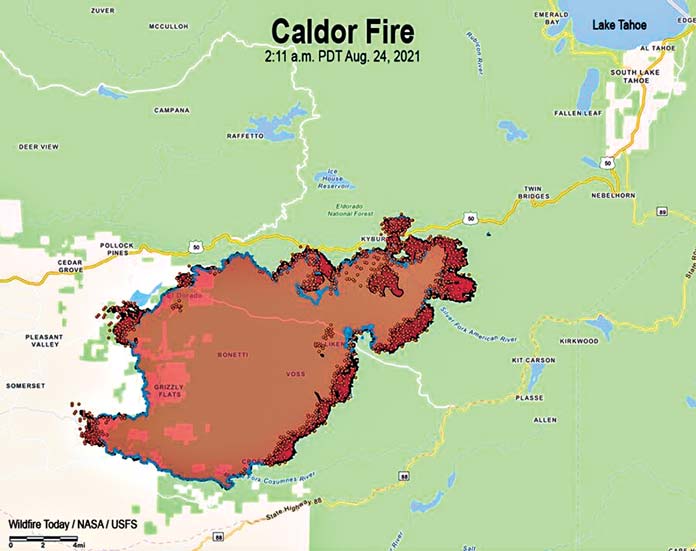
On Friday, Aug. 27, 2021, I received a text form my Lieutenant, Glen Julian. He was looking for a volunteer willing to commit to 12 days to help with the Caldor Wildfire raging out of control near South Lake Tahoe. Lt. Julian said that I would be assisting El Dorado County Animal Control and would be staying in either a tent city with fellow first responders, or possibly in a local hotel. My father had recently passed away, so with the help of my husband to watch and care for my own animals, and looking for some time to be engrossed in activity, I said yes.
The following Friday, I drove to West Valley Shelter, loaded up my animal rescue vehicle and headed North to Placerville, where thankfully El Dorado had reserved a hotel room. Shortly after arriving at the hotel after the seven-hour drive, I met up with fellow LA Animal Control Officer Eddie Anaya. He too, had accepted the call, and over the next ten days we enjoyed our adventure together.
Bright and early the next morning, we met by our trucks and followed each other to our assigned meeting place for a briefing. Smoke began to thicken as we drove 30 miles to the Emergency Operating Center. We were sent to a dispatch point where other Animal Control Officers were picking up assignments for the day; I counted approximately 30 Animal Rescue trucks from different areas of the state all coming to help. In plentiful amounts were supplies for animals and humans and a state-of-the-art motor home equipped with communications and up-to-the moment information of where the active fire was burning with lists of calls from people needing help for their animals. When we went to pick up our calls, we were told that Los Angeles Officers were being redirected to South Lake Tahoe, where assistance was desperately needed. Eddie and I packed up our things to meet El Dorado County dispatch Officers at the Hard Rock Casino and Hotel, where we would be staying for the next 11 nights while working continuous 11- to 12-hour days.
We headed north on U.S. 50. As we headed out of Placerville, we encountered a roadblock check point. The Officers checked our vehicle and waved us on through the blockade. Driving along this highway that was closed to traffic was eerie. The smoke grew denser and there was no escaping the smell of the fire as we traveled farther into the mountains. We passed firetrucks, strike teams, police and other emergency vehicles as we drove. Active fire was observed as we moved along, sometimes with no firefighters in sight as embers and wind kicked up. A beautiful stream tumbled along the edge of the road, and smoke hung thick along the ravine. Visibility was limited as we drove farther north. I noticed a “for sale” sign along the highway and glanced up toward the home. All that was left was a driveway leading to a burned-out home with a stone chimney standing all alone. It was not the only one. We passed many smoldering buildings as we drove the three hours to South Lake Tahoe. As we drove into South Lake, the smoke was thick and heavy and there was no relief from it.
A large room on the first floor at the back of the Hard Rock Casino served as El Dorado County Animal Control’s dispatch center. They had been forced to leave their animal shelter when fire and flames reached the hillside at their back door. Computers, printers, radios, and daily updated fire maps on the walls showed fire containment, or lack thereof. They provided drinks and snacks for the Officers, and meals were delivered and served at dispatch; we ate very well throughout our stay. A whiteboard listed all the Officers reporting daily with their contact phone numbers, home bases and their assigned teams. Officers paired up as most calls involved entering requestors’ homes to care for their animals that were left behind when the owners evacuated. This list changed daily as Officers came and left when their volunteer time ended. Eddie and I were Teams 1 and 2. During our briefing, they instructed us to look for injured and stray pets along with injured wildlife. In addition, they alerted us to watch for looters as there were reports of looting in the evacuated and closed areas of town. “Snap a photo if you can safely do so and report the location to dispatch,” they instructed. We picked up our calls and set off.
Into the Cauldron
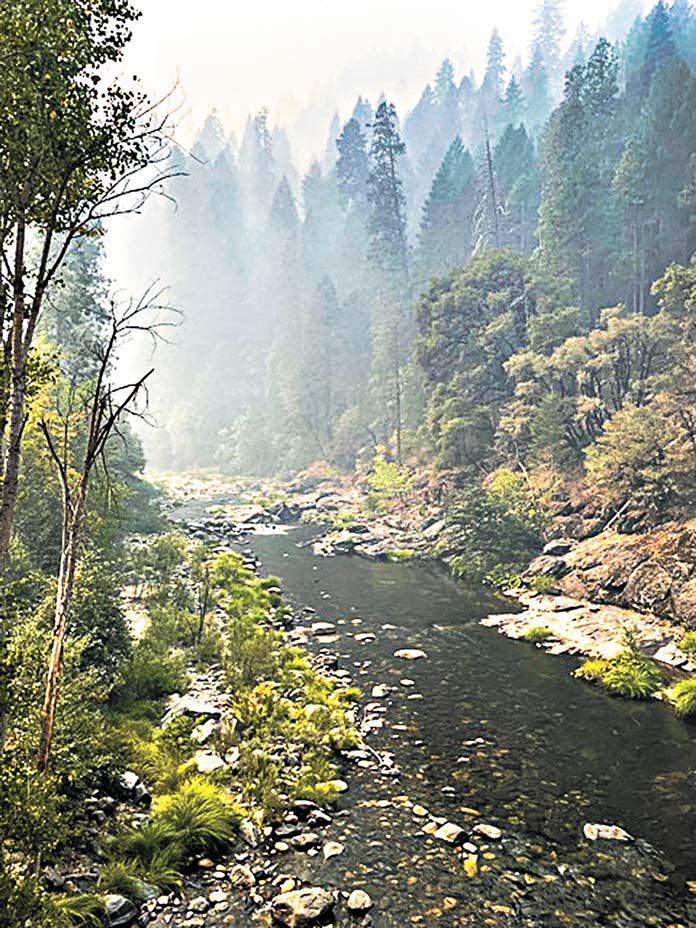
Not being familiar with the area was a challenge at first. We quickly learned the problem with using an app like Waze to find an address as it constantly kept trying to reroute us that were still open when we were in fact going into closed areas. Old-fashioned paper maps were nowhere to be found. We ended up using Google maps on our phones in addition to our department-issued GPS, which allowed us to change the setting so that it no longer excluded closed roads. Since we were teamed up and riding together, Eddie handled the directions and paperwork while I did the driving.
Our days consisted of going from one activity address to the next and caring for the animals that were sheltering in place. Upon arrival, we would call the animal owner and talk to them while we were on site following their directions as best we could. Sometimes a keypad combination was required to gain entry to the home, and other times a key had been dropped off at the hotel dispatch, sometimes even including directions for which door had been left unlocked in case a Firefighter needed to gain access to their house. At night, we would part ways, watch a little TV and get some rest before doing it all over again. There were also nightly debriefing phone calls from our District Supervisor Danny Pantoja checking in on how our day went.
Days passed quickly as we traveled from home to home, feeding fish, cats, reptiles, birds, chickens and even pigs! Sometimes we were asked to throw a little water on a loved house plant or open a window shade, or the homeowners asked us how thick the smoke was. On more than one occasion, owners coached us on how to repair and safely add water to a saltwater fish tank and therefore save the fish. The people we assisted were very grateful and relieved that we were there to care for their beloved pets, freely expressing words of “thank you” and gratitude to us. We observed signs of “Thank You First Responders” posted throughout South Lake Tahoe. We saw firetrucks from San Diego, LA, Burbank, Glendale, the Bay area, and as far away as Oregon and Idaho, and a strike team came from overseas to assist!
Between calls, our leaders asked us to patrol large areas of town driving up and down every street looking for injured animals and looters. We observed many break-ins, seeing many broken fences, garage doors and a doorway or two. The looters, however, were black bears! The bears moved freely through neighborhoods and enjoyed the absence of humans. They moved from house to house trying to get inside as they smelled food beginning to rot with no people around. One day, we watched a black bear using his hands to pry off a screen under a house. Our presence scared him off and he ambled across the road past the back of our truck and climbed over a fence into another backyard. Another day, we received a call for a bear inside a house when the owner came home and found him sleeping on her bed. Every day was an adventure!
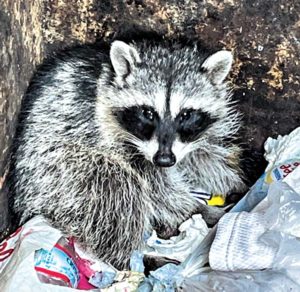 As the days passed, the smoke began to lighten and the beauty of the trees, sky and the crystal clear lake came into view. As neighborhoods began to repopulate, our efforts began to shift to more normal calls — a raccoon trapped in a dumpster, picking up a stray dog, a dead animal pickup, and then taking equipment and animals back to the El Dorado Animal Shelter. We drove to Carson City for supplies and moved animals from Douglas County Fairgrounds, where evacuated animals were being housed back to dispatch and to the shelter for owners to be reunited. Still, we continued our patrols in the closed areas of town. All told, we drove more than 2,000 miles during the 12-day deployment.
As the days passed, the smoke began to lighten and the beauty of the trees, sky and the crystal clear lake came into view. As neighborhoods began to repopulate, our efforts began to shift to more normal calls — a raccoon trapped in a dumpster, picking up a stray dog, a dead animal pickup, and then taking equipment and animals back to the El Dorado Animal Shelter. We drove to Carson City for supplies and moved animals from Douglas County Fairgrounds, where evacuated animals were being housed back to dispatch and to the shelter for owners to be reunited. Still, we continued our patrols in the closed areas of town. All told, we drove more than 2,000 miles during the 12-day deployment.
The people whom we met, the new connections made and the good will combined to make the time an uplifting adventure. Learning a little about how other Animal Control Officers and departments do things made me a better Officer. It has refreshed me and helped me to remember why I became an Animal Control Officer in the first place. There is no greater reward than helping animals and people and living up to our directive in Animal Services. I love my job and I am blessed to be part of this team!


